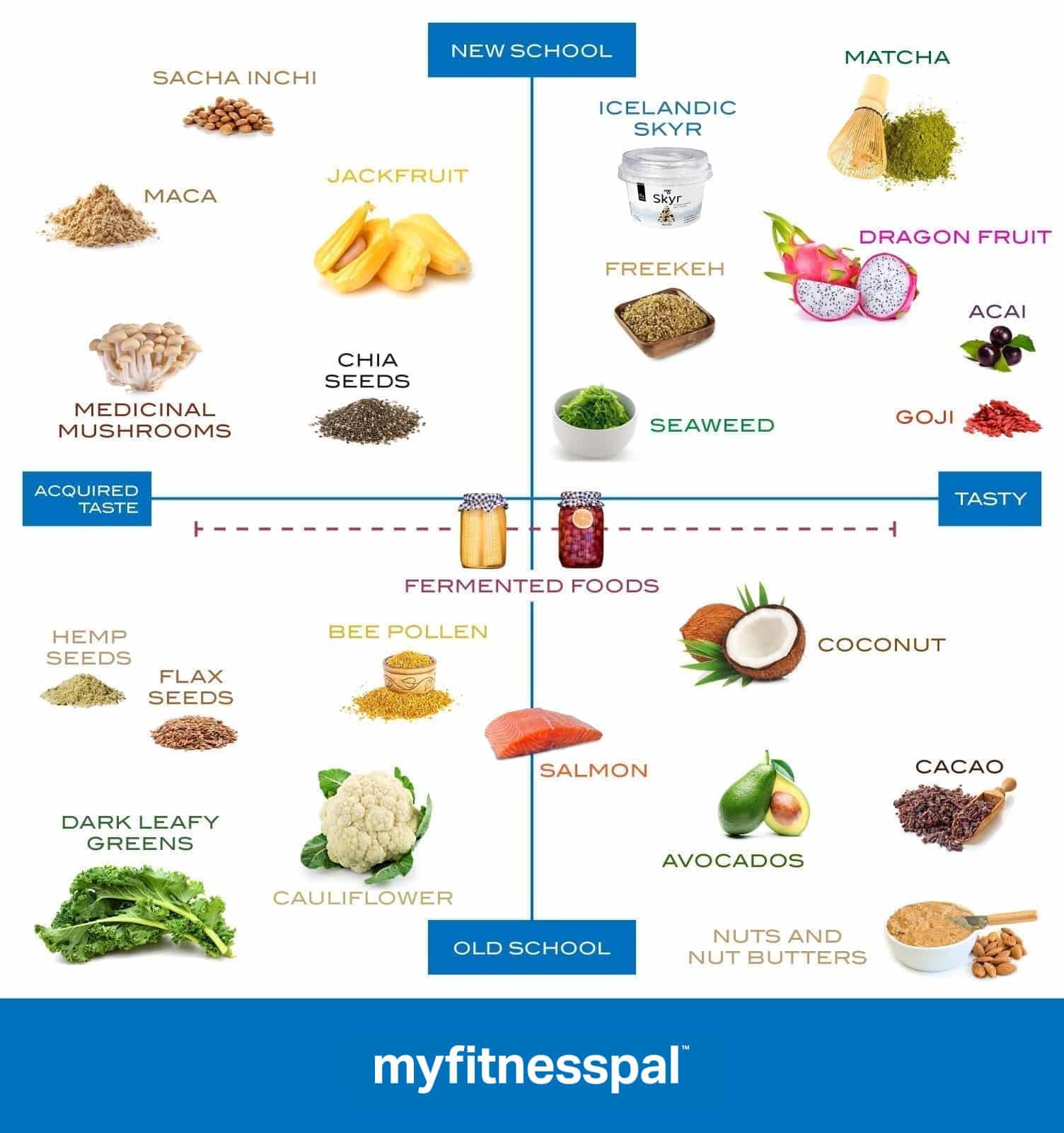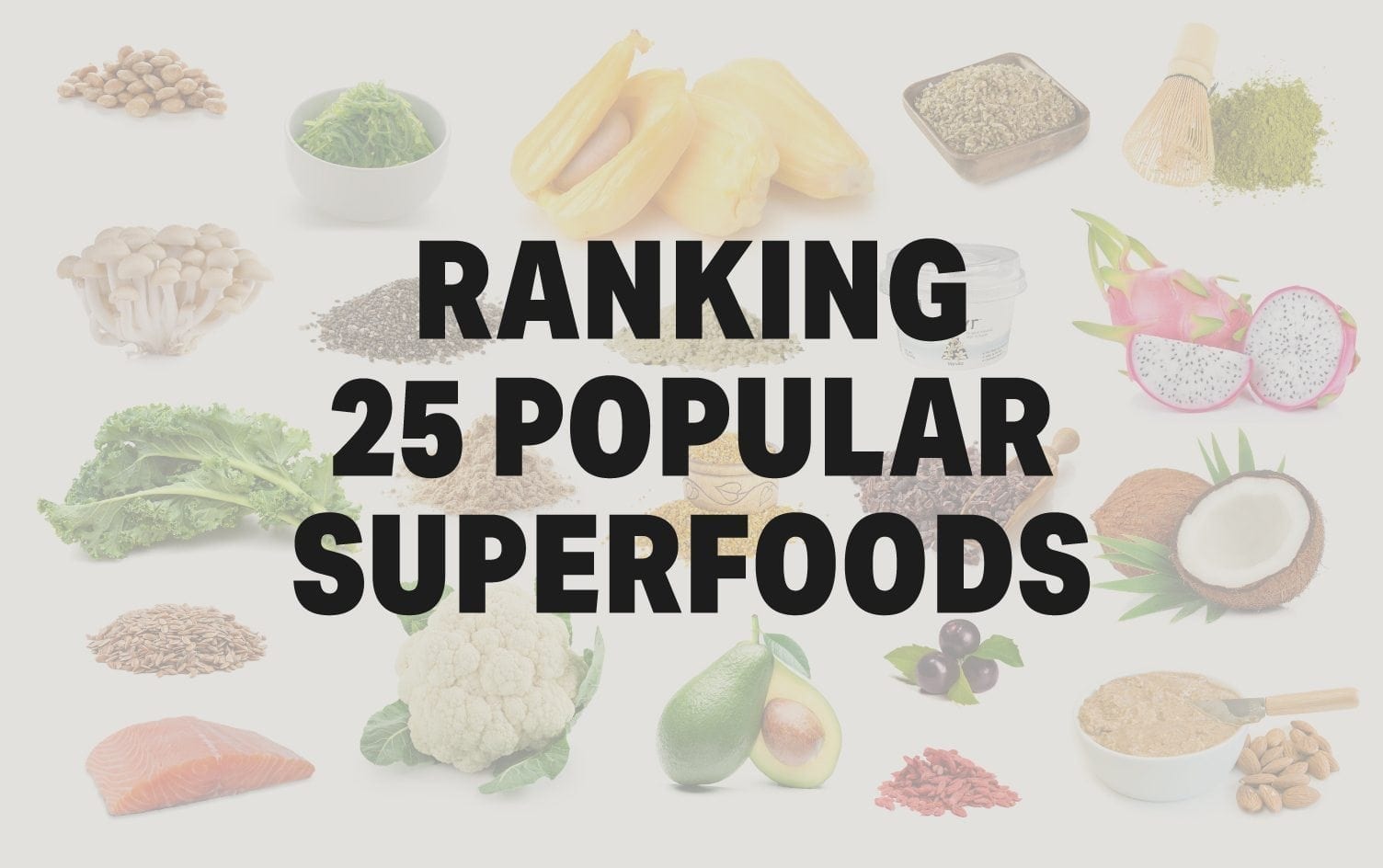If you’ve been curious about some of the health foods that have taken Instagram by storm, take a glance at our top 25 foods of the moment to learn what makes these picks so good for you.

ACAI
Acai is a rainforest berry loaded with antioxidants and anthocyanin pigments, said to provide a boost of energy. Enjoy it blended into a smoothie or as an acai bowl, topped with granola, nuts and your favorite fruits.
AVOCADOS
Avocados aren’t just for guacamole. These buttery fruits contain antioxidants, heart-healthy monounsaturated fats and fiber to help keep you satiated. Eaten straight out of its skin, smashed and spread onto toast, chopped and mixed into a salad or even blended into a smoothie — the possibilities are endless.
BEE POLLEN
Bee pollen is a ball of pollen granules created by worker bees as they fly from flower to flower, forming part of “bee bread,” the main food source for a beehive. Bee pollen is brimming with vitamins, antioxidants, minerals, as well as 22 essential amino acids. Said to be great for the immune system and nervous system, bee pollen is also associated with regulating blood sugar and cholesterol levels. Sprinkled on yogurt, in a smoothie or simply eaten by the spoonful are just some of the ways to enjoy this superfood.
CACAO
Cacao is the raw form of one of our favorites sweet treats — chocolate. Beans from the cacao tree are dried, fermented and minimally processed, and they are an excellent source of fiber, magnesium and iron. Cacao also contains flavanols associated with elevated mood and cognitive function. Raw cacao powder can be used in place of unsweetened cocoa powder in many recipes, and cacao nibs (chunky pieces of crushed cacao beans) can be added to oatmeal, acai bowls or baked goods to provide a satisfying crunch.
CAULIFLOWER
Cauliflower is an incredibly versatile food. Riced, puréed, made into a pizza crust (yes, really) or even added to a smoothie, this cruciferous veggie has 77% of the recommended daily value of vitamin C per serving, as well as healthy amounts of vitamin B6 and plenty of fiber. Because of its fairly mild and adaptable flavor, you can get really creative — try one of these recipes to embark on your love affair with cauliflower.
CHIA SEEDS
Chia seeds offer plant-based omega-3 fatty acids along with a boost of fiber. When added to liquid, they swell and form a gel with a consistency of custard, so they’re great for thickening smoothies or making a vegan pudding.
COCONUT
Coconut is a truly versatile food and can be incorporated into your diet in many forms, from fresh coconut meat to electrolyte-dense coconut water. Coconut oil is high in medium-chain triglycerides, an easily converted energy source, while coconut flour is a gluten-free baking ingredient and coconut sugar is a low-glycemic sweetener.
DARK LEAFY GREENS
Dark leafy greens like spinach, kale, collard greens and chard are full of iron, vitamin K, fiber and antioxidants. Spinach has a subtle flavor, making it a great addition to smoothies. Kale and chard are delicious in soups or simple sautés. And collard greens make excellent low-carb wrappers for tacos or veggies and hummus. Need ideas on how to get more green goodness? Check out these ways to cook seven of our favorite super greens.
DRAGONFRUIT
Dragonfruit, also known as pitaya, is a brightly colored tropical fruit that has a consistency similar to a kiwi and a flavor that is reminiscent of an earthy watermelon. This fruit is high in antioxidants that can help fight free radicals, as well as filling fiber and vitamin C. Eat as a snack, add to a fruit salad for a burst of color or blend into a smoothie.
FERMENTED FOODS
Fermented foods are naturally loaded with probiotics, so they help maintain gut health. Fermented vegetables can add flavor and texture to a salad or a quinoa bowl, but it doesn’t stop there: Reach for miso, natto, tempeh, pickles, kefir and raw cheese to get a tasty dose of probiotics plus the added benefit of an array of vitamins, minerals and enzymes.
FLAX SEEDS
Flax seeds deliver a plant-based dose of the omega-3 fatty acid alpha-linolenic acid, making them heart-healthy and anti-inflammatory. To get the most benefit out of flax, grind the seeds, then sprinkle on oatmeal, salads or your favorite smoothie.
FREEKEH
Freekeh is a type of wheat that has long been a staple in Middle Eastern diets and has recently shown up on restaurant menus, touted as an “ancient grain.” It has twice as much fiber and more protein than quinoa. Freekeh has nutty, earthy flavor with a hint of smokiness, and it can be used in any dish that calls for whole grains.
GOJI BERRIES
Goji berries, also known as wolf berries, have been used in traditional Tibetan medicine for centuries. These tiny berries are high in antioxidants called carotenoids (like beta-carotene), iron and nearly twice the daily value of vitamin A. Mild and tangy, with a texture similar to raisins, these can be eaten on their own, used as a topping for overnight oats, or as a mix-in for granola or trail mix.
HEMP SEEDS
Hemp seeds are another heart-healthy seed that hold an enormous amount of protein, omega-6 (linoleic acid) and omega-3 (alpha-linolenic acid) fats. Studies have shown hemp seeds may reduce the risk of heart disease, and they have been said to alleviate symptoms of menopause. They can be eaten raw, cooked or lightly toasted, added to cereal, oatmeal and sprinkled over salad for a dose of healthy fats and fiber.
JACKFRUIT
Jackfruit is a tropical fruit that is rich in vitamins, minerals, electrolytes and phytonutrients. Eaten ripe, it has a slightly sweet taste, but unripe green jackfruit can serve as a substitute for meat — braised in a savory sauce, the cooked jackfruit has a consistency similar to shredded pork.
KOMBUCHA
Kombucha is a slightly sour, usually effervescent beverage made by fermenting sweetened tea. Today, you’ll find this beverage widely available at your local health food store and at some restaurants, where you might even be able to get it on tap. Kombucha is high in gut-friendly probiotics and low in calories.
MACA
Maca is a root traditionally used to balance hormones, increase energy and libido, and reduce stress. It is considered an “adaptogen,” a natural substance that helps the body adapt to stressors and normalize bodily processes. Maca powder contains plenty of amino acids, vitamins and minerals, too. Add this to smoothies or even your favorite recipes that include chocolate, as maca’s maltlike flavor and chocolate make a great combination.
MATCHA
Matcha is a powder made from the ground leaves of shade-grown green tea plants. This tea contains loads of antioxidants, and since you’re ingesting the entire leaf, you also get a dose of fiber and chlorophyll. The traditional serving is made with matcha powder and hot water, but if that doesn’t excite you, perhaps one of these recipes will!
MEDICINAL MUSHROOMS
Medicinal mushrooms like reishi, cordyceps and chaga are an ancient, often wild-harvested group of foods that have been used for centuries in Eastern medicine. Each mushroom has a specific set of properties, ranging from boosting blood oxygen and promoting proper digestion to providing cardiovascular health support and improving the immune system. Today, dried and powdered medicinal mushrooms can be found at health food stores, and they can be easily added to soups, coffees, teas and more.
NUTS AND NUT BUTTERS
Nuts and nut butters, just like avocados, are rich in healthy fats and fiber and may contribute to lowering cholesterol. If you consume nut butters, steer clear of those with added sweeteners and opt for those that are 100% ground nuts. Choose nuts as a filling snack, or spread nut butter on toast, swirl into oatmeal or add to your morning smoothie.
SACHA INCHI
Sacha inchi, also known as Inca peanuts, are seeds that comes from the Peruvian highlands.They are full of proteins, omega-3 and 6 fatty acids, vitamin E and fiber. The oil from this nutty superfood has a flavor that is lighter than olive oil, and it can be used for cooking or as the base for salad dressing.
SALMON
Salmon contains high levels of omega-3 fats, which can help reduce inflammation. Wild-caught salmon is a sustainable food source that provides up to 58% of your daily protein needs per 4-ounce serving, vitamin D and selenium, as well as bioactive peptides that can aid in regulating collagen synthesis, a key function in maintaining joint health. Salmon can be eaten simply pan-fried, grilled, broiled or made into burgers with your favorite spices and herbs.
SEAWEED
Seaweed (aka sea vegetables) contains high amounts of minerals including iodine, iron, magnesium and calcium and plenty of immunity-boosting vitamin C. Try a Japanese-style wakame or hijiki salad, or snack on seasoned nori. New to sea veggies? Ease into it by using kelp granules or dulse flakes on your food in place of table salt.
SKYR
Skyr, or Icelandic yogurt, is thicker and less sour than Greek yogurt, and, since it’s made with skim milk, is also naturally fat-free and lower in calories. Like Greek yogurt, skyr is high in protein and calcium, and it also contains probiotics that are said to help boost healthy bacteria flora in the digestive tract.
SPIRULINA
Spirulina, a freshwater blue-green algae, is 60% protein by weight, high in antioxidants and B-vitamins. Often available in a powder, it can be added to smoothies or sweeter juices, but if the fishy flavor of spirulina isn’t your favorite, opt for tablets instead.




